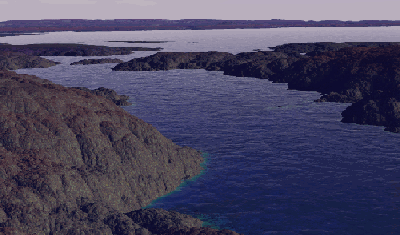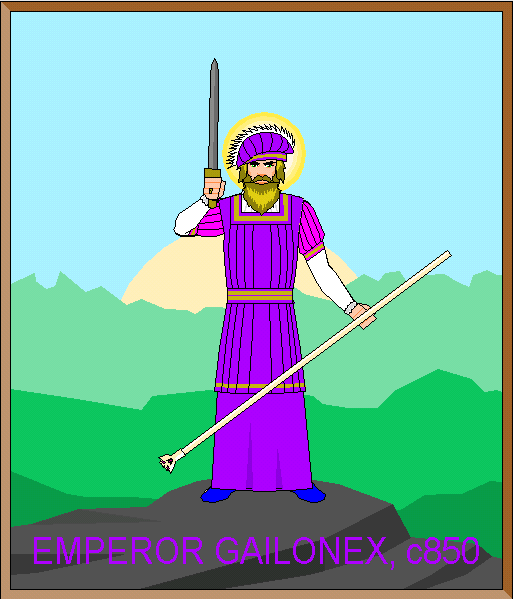|
Home Page
Discovery of Atlantis
First Empire-(1) to 261
Second Empire- (1) 361 - 409 |
|
THE SEARCH FOR OVERALL PEACE: THE INTERNATIONAL CONFERENCES OF THE 850s.
Yciel Atlantis
The late 840s and 850s were the highpoint of Gailonex’s rule. His Empire was now strongly governed, quiet, generally defensive in posture, and Gailonex put Atlantis back on the world stage, following the successful war with Skallandieh. He did this by organising a series of new International Conferences. The first was held in Atlantis in 851, and involved Atlantis, Rabarrieh, Quendelieh and some of the independent Skalland states. Little was really achieved, except to agree to all of Rabarrieh’s land gains in the south, in other words, the take-over of Uarilteccoth, and some settlements over naval forces in the Helvengio. Another Conference followed in 856, but this merely agreed the status quo, mostly in favour of Rabarrieh, which Atlantis tended to appease, despite Quendelieh’s misgivings. In 855, Miolrel revolted, and sought to join Rabarrieh; Atlantis quashed the revolt. At the 856 Conference, Atlantis took a harder line against the Rabarrans, refusing her demands to grant joint governorship of the city to Atlantis and Rabarrieh together. Indeed the Emperor sought, belatedly, to try to isolate Rabarrieh by forming pacts or alliances with Ughrieh and the Far Southern Continent. As the Ughans were pressed equally by Rabarrieh, the attempt was unsuccessful. except in as much as the Ughans promised to be neutral in any future conflict between Atlantis and Rabarrieh. However, the Far Southern Continent secretly agreed to attack Rabarrieh whenever a full-scale war between Atlantis and Rabarrieh erupted.
THE END OF THE REIGN: INCREASING DISAFFECTION WITH GAILONEX’S PATERNALISM At home, during the 850s, and particularly in the latter part of the decade, the prosperous, settled façade of the regime became undermined by increasing financial and economic problems and growing poverty, especially amongst non-Atlantean inhabitants. The lavish spending by the State in the 830s and 840s reconstructing the Empire and fighting a costly war, and then maintaining the swollen facade on a declining infrastructure (industry and population were static or declining in the 850s and 860s), led to higher taxes and less revenue, inflation and finally business and bank collapses. Expenditure on education and social services was also pruned back, leading to harder times for many and poverty for some. At the same time, spending on the Army was not cut back, while the lavish lifestyle of the Emperor, his family and Court, and the prosperous ruling class grew more outrageous, and more resented, as the gap with the poorer classes grew ever greater. These cutbacks contributed to the disaffection towards the regime that increasingly manifested itself in the last few years of Gailonex’s life. By this time the Emperor was growing old and his grip was beginning to slacken. There was a loosening of his authoritarian rule, and voices of dissent were making themselves heard. These related partly to growing political dissent, with demands for more democracy, and also pleas for more industrial development. There was in particular the founding of a movement by young enthusiasts and up-and-coming politicians called "Past into Future", ostensibly and initially a "loyal opposition" seeking social and industrial liberalisation. At the same time, Gailonex’s great social experiment which imposed his whole vision and way of life, the Natural Morality and transcendental philosophy worked out by Fusten and Saiphoyen, on the Empire was for the first time seriously questioned. A younger generation was appearing, wanting to break out from Gailonex’s authoritarian straitjacket. They longed to escape from the seriousness and immobility of Gailonex’s state, and in reaction adopted hedonistic and materialistic ways of life, which shocked and angered their older compatriots. They also wanted to be more cosmopolitan, and looked to the cultures of other states for inspiration. Some even looked to Rabarrieh and the Rabarran way of life, and this above all infuriated moderates and conservatives alike. There were also dissenting voices from what we might call the "right wing", who wanted a harder line to be taken at home, and more importantly, abroad. They wanted Atlantis to stop its apparent appeasement of Rabarrieh, and try to regain some of the territory and peoples lost to the Rabarran encroachments. They felt that Atlantis should stand for free and rational values (albeit under a very paternalistic government, which would prevent any sort of republican or tyrannical-style excesses), and should never give way to Rabarran authoritarianism and religious frenzy. This growing conflict between generations was also reflected in the arts. Earlier in the century, there had been something of a late-flowering artistic renaissance. Most notable were Tuonno and Cairille Norcarel, husband and wife, who were marvellous elegiac poets in the 830s and 840s, writing their verse sometimes separately and sometimes jointly. Their works became more bitter later, mourning the loss of life caused by the Great Northern War, but generally they kept clear of political commitment. The composer Mistjin, a Helvran, was also important after the 840s: he composed initially vast, pseudo-antique Total Works of Art, but later exquisite miniature chamber works. Finally, from 855, the historian Nixalen started his chronicles of the Atlantean Empire. He was the last of the great Atlantean historians, and he continued to write right up until his murder by enemy troops in Atlantis in 889. All of these people, plus the other architects, garden designers and writers of this period, were regarded very much as the "old guard" by the new rebels of the 860s, and so far as art was concerned, the latter aimed at a purely iconoclastic style, which broke with all tradition. THE DEATH OF GAILONEX AND THE JOINT SUCCESSION TO THE THRONE The death of the old Emperor did not happen suddenly, and the succession would naturally have gone to Gaiduiccon, his eldest son (though the two daughters were older). Gailonex certainly showed no interest in widening the search for a new Emperor outside his own family, and there was no serious objection to this from anybody else. However, Gailonex did consider, quite correctly, that Gaiduiccon was more liberal-minded than he was – indeed he had covert contacts with some of the "Past into Future" group. So the Emperor inserted a provision in his will that Gaiduiccon should rule jointly with Gaistuyex, the younger but much more militaristic and authoritarian son. This was likely to be a recipe for family conflict, as indeed occurred, and many thought Gaiduiccon would soon succumb to his evidently stronger-minded and more decisive younger brother. It surprised many that this did not in fact happen at once. Instead, following Gailonex’s death in 865, Atlantis suffered several years of debilitating conflict, with coups and counter-coups, between the two brothers and their supporters. This tended to prevent the Empire from developing either into a more fully democratic, or a more effectively militarised society: Atlantis was thereby seriously hindered from dealing effectively, whether by diplomacy or force, with threats from Rabarrieh and other neighbouring states. To read about the Early Final Wars of Atlantis, click on The Early Final Wars (1)- 865 - 875 |

